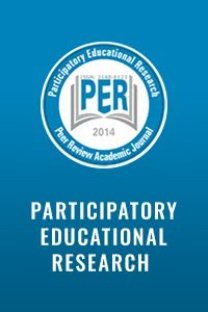Preschool Teachers' Perspective Of Science Activities
pre-school teacher, science education, science activities views on the science activities,
___
- Akman, B., İzgi, Ü., Bağçe, H., & Akıllı, H. İ. (2010). İlköğretim öğrencilerinin fen’e karşı tutumlarının sınav kaygı düzeylerine etkisi (The effects of test anxiety level of primary school students' attitudes toward science). Eğitim ve Bilim, 32(146), 3-11.
- Aktaş Arnas,Y. (2002). Okul Öncesi Dönemde Fen Eğitiminin Amaçları (Objectives of Science Education in Preschool), Çocuk Gelişimi ve Eğitimi Dergisi, 6(7), 1-6.
- Aygören, D. (2000). Okulöncesi Yaratıcı Çocuk Etkinlikleri (Preschool Creative Activities for Children). Esin Yayınevi, İstanbul.
- Ayvacı, H. Ş.,Devecioğlu,Y., Yiğit, N. (16-18 Eylül 2002). Okulöncesi Öğretmenlerinin Fen ve Doğa Etkinliklerindeki Yeterliliklerinin Belirlenmesi (Determination of Adequacy of preschool teachers in Science and Nature Activities). V. Ulusal Fen Bilimleri ve Matematik Eğitimi Kongresi. ODTÜ Kültür ve Kongre Merkezi, Ankara
- Çakır Ayla, (2011). Okul Öncesinde İlgi Köşelerinin Düzenlenmesinin ve Kullanılmasının Öğretmen Görüşlerine Göre Değerlendirmesi (Assessment by the Regulation of Interest in Corner Pre-School Teachers' Perceptions and Use of), T.C. Çanakkale Onsekiz Mart Üniversitesi Sosyal Bilimler Enstitüsü,Yayınlanmış Yüksek Lisans Tezi, Çanakkale.
- Çınar, S. (2013). Okul Öncesi Öğretmenlerin Fen Ve Doğa Konularının Öğretiminde Kullandıkları Etkinliklerin Belirlenmesi (Determination of the activities they use in teaching Science and Nature Subject Teachers of Preschool). Eğitim ve Öğretim Araştırmaları Dergisi, 2(1), 364-371.
- Dere, H., Ömeroğlu, E. (2001). Okulöncesi Dönemde Fen Doğa Matematik Çalışmaları (Preschool Math Science and Nature Studies), Ankara: Anı Yayıncılık.
- Elmas H. & Kanmaz A. (2015). Okul Öncesi Eğitim Öğretmenlerinin Fen Eğitimine İlişkin Görüşlerinin Belirlenmesi (Determination of Opinion on the Science Education of Pre-school Teachers), Eğitim Ve Öğretim Araştırmaları Dergisi, 2, s.36.
- Karamustafaoğlu, S.Kandaz, U., (2006). Okul Öncesi Eğitimde Fen Etkinliklerinde Kullanılan Öğretim Yöntemleri ve Karşılaşılan Güçlükler (And Challenges of Teaching Methods Used in Preschool Education Science Activities). Gazi Üniversitesi Gazi Eğitim Fakültesi Dergisi, 26(1), 65-81.
- MEB, (1993). XIV. Milli Eğitim Şurasi, Raporlar, görüşmeler, kararlar. (Fourteenth national education board, reports, interwievs, decisions). istanbul, Türkiye: Milli Eğitim Basimevi.
- Oğuzkan Ş., Oral G. (1993). Okulöncesi Eğitimi (Early Childhood Education). Milli Eğitim Basımevi, İstanbul.
- Parlakyıldız B. & Aydın F. (2004). Okul Öncesi Dönem Fen Eğitiminde Fen Ve Doğa Köşesinin Kullanımına Yönelik Bir İnceleme (A Study for the Use of Preschool Science Education in Science and Nature Corner), XIII. Ulusal Eğitim Bilimleri Kurultayı, İnönü Üniversitesi Eğitim Fakültesi, Malatya.
- Saçkes, M., Flevares, L. M., Gonya, J., & Trundle, K. C. (2012). Preservice early childhood teachers' sense of efficacy for integrating mathematics and science: Impact of a methods course. Journal of Early Childhood Teacher Education, 33(4), 349-364.
- Senemoğlu, N. , (1994). Okulöncesi Eğitim Programları Hangi Yeterlikleri Kazandırmalıdır? (Which competencies should Outcomes in Early Childhood Education Programs?) , H.Ü. Eğitim Fakültesi Dergisi, Sayı.10, Ankara.
- Sığırtmaç, A. & Özbek, S. (2011). Okul öncesi öğretmenlerinin fen eğitimine ilişkin görüşleri ve uygulamalarının incelenmesi (Examination and opinion on the application of pre-school teachers in science education). e-Journal of New World Sciences Academy, 6 (1),1039-1056
- Ünal M. & Akman B., (2006). Okul Öncesi Öğretmenlerinin Fen Eğitimine Karşı Gösterdikleri Tutumlar (Against the attitude they show the teacher Preschool Science Education). H.Ü Eğitim Fakültesi Dergisi, 30, 251.
- Wortham, S. (1998). Early childhood curriculum: Developmental bases for learning and teaching (2nd ed.). Upper Saddle River, NJ: Merrill/ Prentice Hall.
- Yaşar, Ş., (1993). Okulöncesi Eğitim Öğrencilerinde Fene Yönelik Duyuşsal Özellikler (Features of perception towards Science in Early Childhood Education Students), 9. Ya-Pa Okulöncesi Eğitim ve Yaygınlaştırılması Semineri, Ankara: s. 140–142.
- ISSN: 2148-6123
- Yayın Aralığı: Yılda 6 Sayı
- Başlangıç: 2014
- Yayıncı: Özgen KORKMAZ
Mehmet YAKIŞAN, Şadiye KARAŞAH
Gürbüz OCAK, İjlal OCAK, Nil AKYOL
Pınar ÖZTÜRK GENİŞ, Aykut Emre BOZDOĞAN, Zehra AKTAŞ
Nursel YALÇIN, Berker KILIÇ, Çiğdem ATATAY
Gürbüz OCAK, İjlal OCAK, Serkan BOYRAZ
Selahattin ARSLAN, Neslihan SÖNMEZ
Aslı YERLİKAYA, Mahir YERLİKAYA
